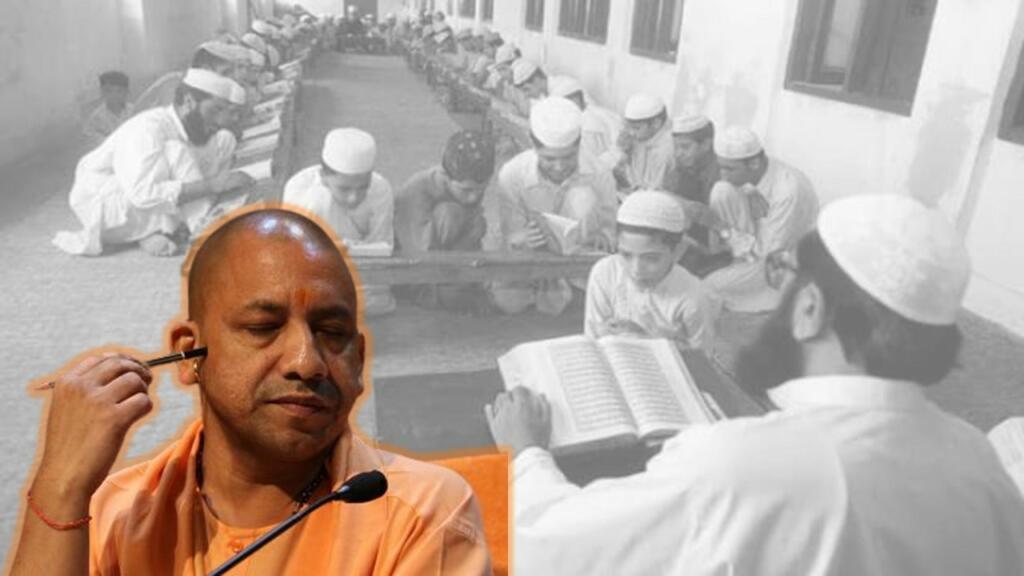Unrecognized Madarsa in UP: The issue of illegal funding through madrasas is far from novel, and states across India have grappled with diverse strategies to counter this challenge. However, the recent turn of events in Uttar Pradesh, under the leadership of the assertive UP Chief Minister Yogi Adityanath, has brought forth a novel approach to address unrecognized Madarsa concern.
In a bold move, the Uttar Pradesh (UP) education department has initiated a comprehensive campaign by issuing notices to all madrasas operating within the state. These notices from UP come with a clear ultimatum: either unrecognized Madarsa that lack the requisite recognition must promptly cease their operations, or they will incur a daily fine of Rs 10,000.
The notices serve as a potent instrument in the pursuit of educational standards, legal compliance, and uniformity within the state’s educational landscape. So join us as we delve deeper into this innovative approach and its implications for the madrasas operating in Uttar Pradesh.
UP: “Pay 10000 per day for every unrecognized Madarsa”
Yogi Adityanath, a prominent political figure known for his uncompromising stance against illegal institutions and the improper financing of religious establishments, regardless of their religious affiliation, has once again made headlines with a new approach. Unlike his previous strategies, which often involved bulldozing such establishments, the Yogi administration has opted for a more targeted method this time.
In the ongoing campaign, a Special Investigation Team (SIT) has already been formed to address the issue of illegal madrasas. However, the education department in the state of Uttar Pradesh has taken a more strategic approach. They have issued notices to all madrasas, instructing them to either cease their operations immediately or face a daily fine of Rs 10,000 if they lack proper recognition.
The notices explicitly stipulate that madrasas with recognition must provide the requisite documents to the education department within a strict three-day timeframe. In cases where inspections have revealed that certain madrasas are operating without recognition, they may be subject to fines of up to one lakh rupees, in addition to the daily penalty.
The notices refer to a provision within the Right to Education Act, which mandates that “no school, other than a school established, owned, and controlled by the appropriate government or the local authority, shall, after the commencement of this act, be established or function without obtaining a certificate of recognition from such authority, by making an application in such form and manner as may be prescribed.”
This move by the Yogi Adityanath-led government in Uttar Pradesh underscores a concerted effort to regulate educational institutions, including madrasas, and ensure compliance with legal and educational standards. The emphasis on proper recognition and adherence to established regulations is in line with the broader objective of promoting transparency and accountability within educational institutions, regardless of their religious or community affiliations.
The choice to impose daily fines for unrecognized institutions reflects a determination to enforce the law and encourages institutions to promptly address their recognition status. While the move may be seen as rigorous, it aligns with the principles of accountability, legal compliance, and uniformity in the realm of education.
Never underestimate Yogi
As the Uttar Pradesh government’s bold move to issue notices to madrasas unfolds, it has triggered a predictable response from the madrasa administration, who vehemently declare the action as illegal. Madrasa managers, along with other concerned parties, are vehemently objecting to the premise that madrasas fall under the purview of the Ministry of Minority Affairs, thus implying that the state’s education department lacks the authority to regulate them.
Iftiqar Ahmed Javed, the chairperson of the state’s Madarsa Shiksha Parishad, emphatically stated, “The state’s notification of 2004 and the rules of 2016 clearly specify that no department other than that of minority welfare has the right to inspect or serve any kind of notices to madrasas. It has come to our attention that staff from the local education department frequently conduct inspections of madrasas, blatantly exceeding the bounds of their authority.”
However, it is essential to remember that Chief Minister Yogi Adityanath is at the helm of this initiative. Known for his resolute approach, he is not one to engage in diplomacy or protracted negotiations. Moreover, the issue he is addressing through this innovative approach transcends mere procedural disputes; it delves deep into a more profound and pressing concern.
The state of Uttar Pradesh is home to a staggering number of over 25,000 madrasas. Of these, more than two-thirds hold official recognition, while the remainder are merely affiliated with the state’s Madarsa Board. In a survey conducted in November 2022, it was revealed that 8,500 madrasas, operating without the state’s recognition, were still functional. In response to these irregularities, the UP Board of Madarsa Education was established in 2017, with the primary goal of monitoring and regulating the functioning of madrasas within the state.
Also read: “What’s stopping us from reclaiming Sindh?” asks Yogi
To complicate matters further, a simple analysis conducted in November of the same year revealed that over 1,500 madrasas were operating with questionable sources of funding, particularly in towns situated near the Uttar Pradesh-Nepal border. This prompted the state government to direct district magistrates to initiate investigations into the financial underpinnings of these unrecognized madrasas. These institutions appeared to be considerably sustained by zakat (money from charitable donations) and other forms of external contributions.
In the face of such intricate issues, Chief Minister Yogi Adityanath’s unorthodox approach signifies a determined effort to address the intricate web of challenges related to the operation, recognition, and financing of madrasas in Uttar Pradesh. The overarching goal is to uphold standards of education and transparency, regardless of the religious affiliations of these institutions, while also ensuring compliance with the law.
Support TFI:
Support us to strengthen the ‘Right’ ideology of cultural nationalism by purchasing the best quality garments from TFI-STORE.COM.
